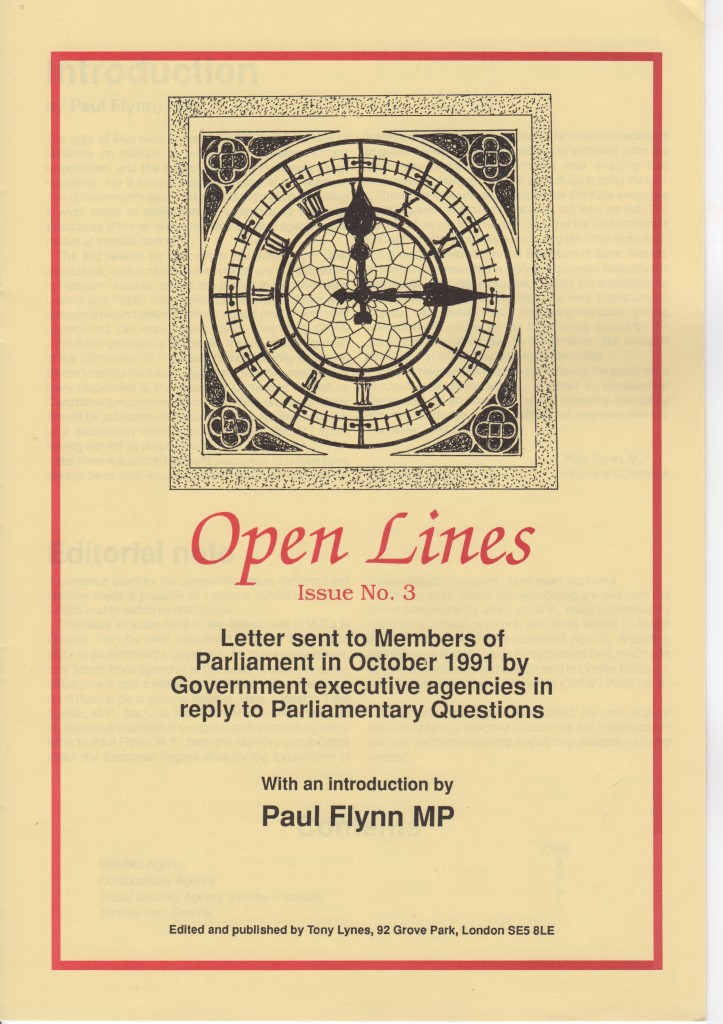Open Lines No. 3 – Letters sent to Members of Parliament in October 1991
Introduction by Paul Flynn, MP:
The right of Members of Parliament to put questions to Ministers on matters for which their Departments are responsible, and the duty of Ministers to answer those questions, are a fundamental safeguard of our liberties. The Government’s decision to curtail this right by referring a wide range of parliamentary questions to the chief executives of the recently created executive agencies is a matter of serious concern.
The first reason for concern is that letters from chief executives, unlike ministerial answers, are not published in Hansard. Instead, copies are placed in the Commons Library and Public Information Office, where those with enough time and determination (a good deal of both may be required) can inspect them. Since June 1991, OPEN LINES has provided a temporary means of making most of the information in these letters more readily available. By the time this third issue appears, the Government may have responded to the House of Commons Procedure Committee’s recommendation that chief executives’ letters should be published in Hansard. If that recommendation or a satisfactory alternative is adopted, OPEN LINES, having served its purpose, will cease publication.
But there is a second reason for concern. Ministers have always been held responsible to Parliament not only for matters of policy but also for the administrative standards of public services: indeed, policy and administration are often inseparable. Ministers are now evading that responsibility, leaving it to chief executives to carry the can.
There might be some justification for this if the executive agencies were independent bodies, but they are not. The Benefits Agency, for example, is part of the Department of Social Security. Its officials, including the chief executive, are directly answerable to the Secretary of State. Indeed, as the Minister revealed in reply to a question tabled by me last month, the chief executive’s letters are submitted for ministerial approval before they are sent (Hansard, 21 October 1991, column 438). That being the case, nothing whatsoever is gained by the letter being signed by the chief executive rather than by the Minister — but a crucial dimension of ministerial responsibility is lost.
What is needed, therefore, is not merely the publication of chief executives’ letters, whether in Hansard or elsewhere, but an end to this whole unworthy attempt by Ministers to dodge their constitutional responsibilities to Parliament and to the public.
Paul Flynn, M.P.
House of Commons
Editorial note
A generous grant by the Joseph Rowntree Reform Trust Ltd has made it possible to continue publishing OPEN LINES and to widen its distribution.
This issue includes most of the letters sent to M.P.s in October 1991 by chief executives and their deputies in reply to parliamentary questions. As in previous issues, only letters from agencies in the fields of social security, employment and training are included, since these are most likely to be of general interest. Thus, a letter to Tony Speller, M.P., from the Veterinary Medicines Directorate on organo-phosphorous compounds in sheep dips, and a letter to Paul Flynn, M.P., from the Meteorological Office about the European Organisation for the Exploitation of Meteorological Satellites, have been excluded.
The only other letters not reproduced are one from the Benefits Agency to Sir John Farr, M.P., about a constituent’s claim for a funeral payment, and three letters to Austin Mitchell, M.P., from the Resettlement Agency, regarding the closure of Bridge House Resettlement Unit, which add nothing of substance to the letter sent to Dudley Fishburn, M.P., in July 1991 and published in OPEN LINES No. 2.
In every case, unless otherwise stated, the main body of the letter and any attached documents are reproduced in full, only the formal opening and closing paragraphs being omitted.

